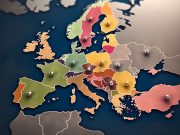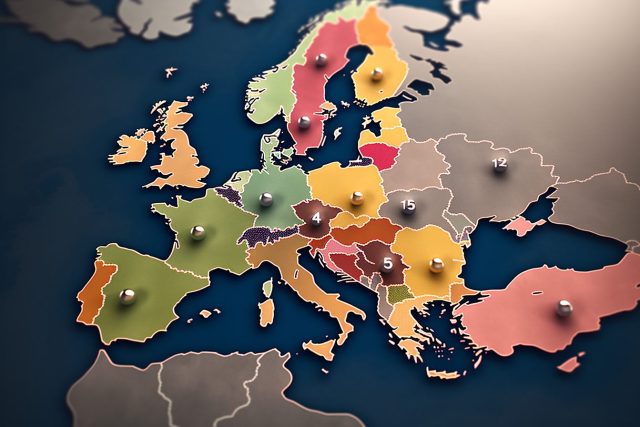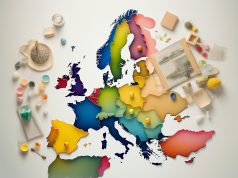The Big 5 of Europe have long been a source of fascination for historians and citizens alike. These five great powers – France, Britain, Germany, Austria-Hungary, and Italy – dominated the European continent from 1871 to 1918. Through their political maneuvering, military alliances, and economic agreements, these five states shaped the future of Europe in ways that still resonate today.
The story of the Big 5 is one of power politics on an international scale. Each nation sought its own advantage over the others; at times they formed alliances to further their shared interests, but ultimately each was concerned with advancing its own agenda first and foremost. While this could be seen as a form of subjugation or control by the major players, it also represented an era where freedom was fought for and won through clever diplomacy and strength of will.
France
The French Revolution was a pivotal moment in the history of Europe. It saw the people rise up and cast off the shackles of their monarchy, reclaiming rights that had been denied to them for centuries. The storming of the Bastille symbolized the start of this revolution, as well as the spirit which it would come to embody; one of freedom, equality and justice.
Napoleon’s legacy has shaped France significantly since then, with his conquests across Europe bringing about sweeping changes in governance, economics and culture. His military campaigns brought victory after victory, conquering vast swathes of land from Spain to Russia. He modernised many aspects of French life through radical reforms such as abolishing feudalism and introducing new laws on education and taxation.
While Napoleon’s reign eventually ended with his exile to Elba, the impression he left on France remains strong today. In particular, he instilled within its citizens an innate sense of pride for their nation – something that continues to drive forward progress even now. This passion is evident wherever you look – be it in politics or business – demonstrating how far France has come since those tumultuous days at the beginning of the 19th century. With these proud foundations as a backdrop, Britain will soon be described in further detail…
Britain
Britain was one of the most influential nations in Europe during this period, and its monarchy systems were a major part of that. The British Empire grew to be one of the largest in world history due to Britain’s colonial power over much of the world. It had an extensive network of trading posts and colonies in Africa, Asia, Oceania and the Americas. This enabled Britain to gain control of vast amounts of resources from around the globe, which gave them immense economic strength and political influence.
The government structure also saw many changes during this time. Monarchy systems evolved from absolute monarchies into constitutional ones where citizens had more rights such as freedom of speech, assembly, religion and press. Parliament gained more power with each passing year as well, making it possible for reforms to take place that shaped how society operates today. Through their participation in international affairs, Britain played an important role in the development and spread of democracy across Europe throughout this era.
As we move along through European history, let us now explore Germany’s rise to power on the continent. Their actions would have a profound impact on all countries within Europe-including Great Britain-for centuries to come.
Germany
Britain had its own unique path of development when it came to imperialism, but the same could not be said for Germany. After becoming a unified state in 1871, Germany quickly began amassing an empire abroad and establishing itself as one of the great powers of Europe. Imperialism in Germany was driven by both economic advantages and national pride, with a heavy emphasis on militarism from Chancellor Otto von Bismarck.
The First World War drastically changed the course of German history – and indeed all of Europe’s. The war saw nearly 2 million Germans perish, leaving many families without fathers or sons; this decimation would have lasting reverberations throughout society. Moreover, defeat meant that much of the country’s colonies were stripped away, leading to profound feelings of humiliation among citizens. This sense of bitterness only grew stronger after the punitive terms imposed by the Treaty of Versailles.
The events between 1914-1918 marked a seismic shift in how Europeans viewed their respective countries: nationalism gave way to disillusionment across many nations who had been affected by conflict. In particular, Germany felt aggrieved at losing so much land while being forced to take responsibility for causing WWI – sentiments which led directly into WWII just over two decades later.
Austria-Hungary
Austria-Hungary was one of the Big Five in Europe, a major power and an important player in European politics. It consisted of two states: Austria and Hungary. These two countries were united under a Dual Monarchy system with joint parliamentary assemblies. This allowed each country to maintain its own government while having control over foreign policy decisions. As part of this system, both countries had their own military forces as well as economic regulations and taxation laws.
The Austro-Hungarian Empire lasted from 1867 to 1918 and during that time it played a significant role in the region’s economy, culture, and politics. Throughout its existence, Austria-Hungary was constantly facing internal tensions caused by nationalistic movements within different ethnic groups such as Croats, Slovaks, Romanians, Slovenes, Czechs or Serbs. In addition to these struggles for independence, there were also frequent clashes between Austrian and Hungarian authorities due to differences in political ideologies.
Despite all these issues and constant changes in leadership on both sides of the border throughout the period of the Dual Monarchy system, Austria-Hungary managed to remain an influential force in international affairs until it dissolved after World War I in 1918. Without any doubt, it could be said that this powerful empire made a lasting impact on European history through its diplomatic efforts and cultural contributions. Moving forward then into Italy’s contribution to early 20th century Europe…
Italy
At the turn of the 19th century, a period which saw the creation and consolidation of some of Europe’s major powers, Italy was in dire straits. While its northern neighbours had forged powerful empires, it remained divided into numerous city-states; many of them under foreign control. As such, Italy represented an anomaly amongst the ‘Big Five’ nations – Austria-Hungary, Prussia/Germany, Russia and France – none of whom were able to realise any sort of unification until much later on. This begs the question: How did Italy manage to unite itself politically?
The answer lies partly with Giuseppe Mazzini and his tireless efforts towards Italian independence throughout his life. A fervent supporter of liberal republicanism, Mazzini sought to garner support for Italian unification through popular democratic means rather than relying solely on military might or force. His ideals resonated strongly with those who opposed foreign rule and inspired others such as Camillo Cavour to join him in his crusade against oppression.
Cavour proved instrumental in realising this dream by using diplomatic tactics that allowed him to gather favour within European politics whilst still maintaining a sense of autonomy from all external interference. He would go onto become prime minister in 1861 after Piedmont-Sardinia effectively annexed several other states thereby creating a unified state known as Italy. In doing so he singlehandedly achieved what eluded people like Mazzini and established the foundation upon which modern day Italian politics stands today.
Frequently Asked Questions
What Other Countries Were Part Of The Big 5 In Europe?
The Big 5 in Europe was an economic alliance of colonial powers that included France, the United Kingdom, Germany, Austria-Hungary and Russia. This powerful quintet comprised a large portion of land mass on the European continent. It is important to note that Italy also played an influential role alongside these five countries during this period; however it did not have as much political influence or power within the alliance due to its more recent unification at the time compared to the other members. While Italy may not have been officially part of this group known as The Big 5 in Europe, it still had major impacts throughout history through its participation in certain events such as World War I.
What Impact Did The Big 5 Have On European Politics?
The Big 5 in Europe was an immense force to be reckoned with and had a huge impact on European politics. Trade alliances and military cooperation between the five nations of Britain, France, Germany, Italy and Russia were unprecedented – all vying for control of the continent’s resources, economy, and ultimate power. Hyperbolically speaking, it felt like these five countries had their hands firmly around the throat of the entire continent! The military strength they wielded was both frightening and awe-inspiring, while also providing great hope for freedom loving people everywhere who eagerly awaited liberation from oppressive regimes.
How Did The Big 5 Contribute To The Development Of European Culture?
The Big 5, comprising of the UK, France, Italy, Germany and Russia, were key players in the development of European culture. They all brought unique contributions to Europe’s cultural diversity; England with its literature and music, France with its art, Italy with its fashion and architecture, Germany with its philosophy and science, and Russia with its theatre traditions. This variety allowed for a rich convergence which added new depth to the continent’s cultural landscape. Moreover, their combined economic strength enabled them to invest in these different cultures as well as influence other nations’ understanding of them through trade deals. Consequently, this vibrant mixture provided an invaluable platform for Europeans to express themselves freely during a time when freedom was starting to become more important than ever before.
What Were The Long-Term Effects Of The Big 5 In Europe?
The Big 5, which were the five major European countries in the late 19th and early 20th centuries, have had a lasting impact on Europe’s politics. Through their competition for regional control, France, Britain, Germany, Austria-Hungary and Russia shaped the Cold War dynamics that defined much of Europe throughout the 20th century. Many of today’s policies still reflect this legacy: Great Power rivalry was an important part of post-WWII reconstruction, with each country striving to ensure its own national interests while trying to limit those of others. This has resulted in increased tension between nations who are still vying for dominance in some aspects of global affairs. It is clear that the long term effects of these powers’ ambitions continue to shape our world today.
How Did The Big 5 Influence World Events During The Early 20th Century?
The Big 5 in Europe played an influential role in world events during the early 20th century. Their regional alliances, combined with their economic competition, had a major impact on global politics. For example, they each sought to increase their influence and spread their respective ideologies by signing treaties of friendship or military cooperation with nations from other parts of the world. This increased tension between countries and caused conflicts that could have been avoided if not for the power struggles among these great European powers. The Big 5’s ambition also led to significant changes in international diplomacy and created a new concept of state sovereignty that still exists today. Through it all, freedom-loving people around the globe were affected by their actions as well as those who wanted nothing more than peace, prosperity, and progress for everyone.
Conclusion
The Big 5 nations of Europe, Britain, France, Italy, Germany and Russia had a profound influence on the world during the early 20th century. They were major powers in European politics and their decisions shaped the course of history. Their contributions to culture have been felt throughout society even today. The legacy of the Big 5 still resonates with us as they helped define a new era of international relations that continues to this day. As we look back at this period in history it is evident that without these five great countries none of what followed could ever have happened. Through their actions they made sure that their place in history would be remembered forever.




























